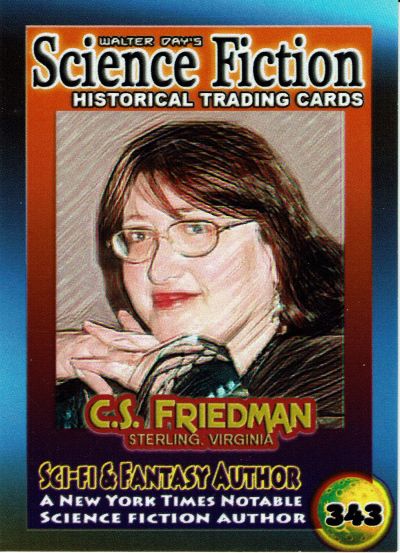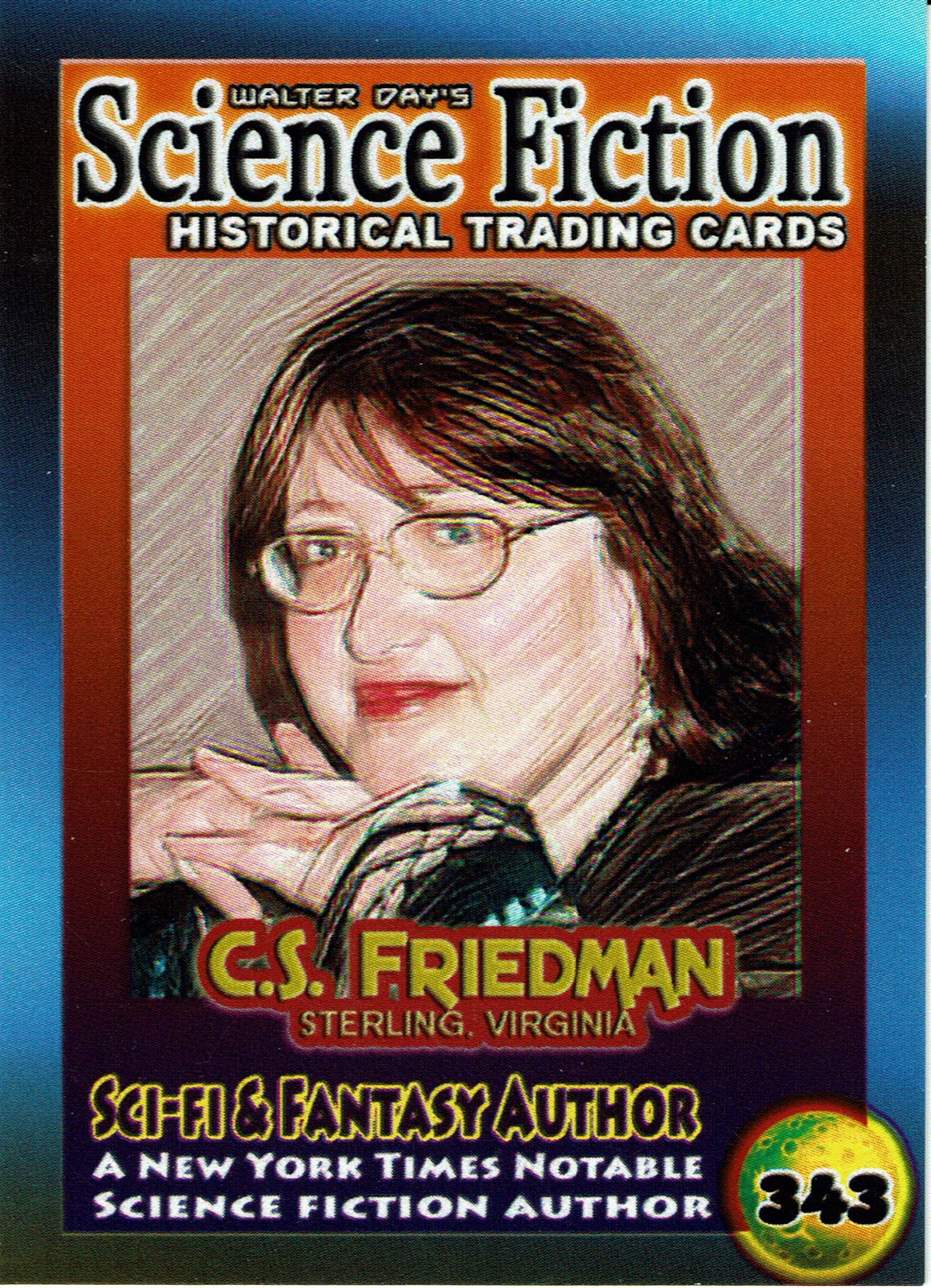- Home
- Articles
- Trading Card Spotlight
- Science Fiction Trading Card Spotlight - C.S. Friedman
Science Fiction Trading Card Spotlight - C.S. Friedman
Our next Trading Card Spotlight features C.S. Friedman who currently is displayed on card number 343, from the Science Fiction Collection. Celia began her interest in science fiction from age 12 and has been creating content ever since. Some of her credits include “The Coldfire Trilogy” and “This Alien Shore”, which was the New York Times Notable Book of the Year. In 2021 she launched Tridac Publishing, to reprint historical works of interest to writer and designers.
How early in your life did you know you would be a writer?
I’ve been writing for as far back as I can remember, but I never thought of it in terms of “becoming a writer.” My dad was a professional writer, so maybe it had no mystique for me. I just wrote because it was something I loved to do, something I couldn’t stop doing.
When I was about 24, I looked down at what I was writing, and thought, “Damn, this is good. I should submit it somewhere and see what happens.” That was a chapter later I included in my first novel, In Conquest Born, and recently reprinted in my short story collection, The Dreaming Kind. It remains one of my favorite works, even after all these years.
Did you ever think when you were younger you would be on a trading card?
No. That is one thing I never imagined. It is very exciting!
What authors do you admire today and who did you look up to as a child?
I grew up on the works of Asimov, Aldiss, Sterling, early Silverberg, Matheson, Sheckley and all the classics. There was a used bookstore near me when I was in grad school that carried a lot of SF, and I devoured all the classics from the 50s and 60s. Writers in that day tended to write short, clean stories, that introduced a concept, told enough story to communicate it, and then ended the story. Such works left my mind buzzing, my imagination inspired by what I had read. Asimov in particular, the author who got me hooked on SF, introduced ideas that I could not stop thinking about. I wanted to write like that. My goal is to tell a great story that you enjoy on a narrative level, and after you are done reading, you can’t stop thinking about the ideas that were in it. If I can give my readers a new perspective on “life, the universe, and everything”, I will have done my job.
Tanith Lee was one of my great inspirations. Her use of language is so beautiful, so lyrical, sometimes it brings tears to my eyes when I read it, because I want to badly to be able to create that kind of beauty with my words. She has been a major influence on my fantasy writing.
In later authors, Brunner, Butler, Brin, Vinge…I just read Who Fears Death by Nnedi Okorafor, and I will definitely be looking for more of her work. I’m loving Rothfuss’ fantasy, but he needs to finish it!
How has writing today changed from when you were younger? What do you like or dislike about the changes?
Plus side: The genre is less male in flavor than it was. Feminine protagonists stood out when I started writing, particularly in fantasy. Now they are as common as male protagonists, and equally interesting.
Con side: Attention spans are shorter. The need for social networking to support one’s writing career is difficult for me, as I was never someone to spend my days chatting online. I don’t know if I would be as successful launching my career today, with that being so important now.
In SF, the rapid advancement of technology has made it risky to play with any kind of prediction. A technology you invent for your book could come into existence—or be proven impossible-- before it is published. That is very different than early SF history, where gazing into what lay ahead 10, 50, 100 years was a writer’s stock-in-trade.
Do you believe some science fiction movies are too violent and lead to violence in America today?
You could make an argument that some uber-violent video games which allow young kids to role-play scenes of violence can desensitize vulnerable minds, because it is interactive—they are identifying with the source of that violence and pretending to commit unspeakable acts—but I don’t believe that just watching movies causes people to become violent, unless they were pretty damn unstable to start with.
What are your favorite type of books and why?
In fiction, books like Vinge’s Fire upon the Deep, that introduce alien concepts about reality and consciousness, as well as fascinating forms of alien life, in the context of a compelling story. I want to sit there and think “Oh, wow”, as I am reading, and think about the concepts in the book long after I put it down.
In non-fiction, I am always searching for information that will inspire story ideas.
What are your favorite hobbies today?
I do lampwork, which is like glassblowing but without the blowing part, focused on beadmaking. I launched a shop on Etsy.com to sell some of my beads and the jewelry that I make from it, called Glass Fantasies, but of late that has become more focused on supplies for other beadmakers to use. I spend a few hours each week crafting chains and other custom beadables for my shop.
I was in the Society for Creative Anachronism for many years, but it has been a while since I have attended. And of course, covid has put a damper on all social activities. I also LARPED with a group that played White Wolf games, and I wrote a sourcebook for Vampire: the Dark Ages.
I just launched a publishing imprint, Tridac Publishing, devoted to reprinting historical works of interest to researchers and writers. Thus far I have reprinted a classic work on the history of human sacrifice and cannibalism, a collection of photographs of early 20th century fashion, a journal illustrated with Victorian fashion plates, and a book of Etiquette and one on Parlor Games from 1883. I’m hoping to turn the imprint into something that people will check out for works that can inform or inspire their writing. (tridacpublishing.com) I have always been a collector at heart, and have thousands of period resources in my library, so this is my way of sharing them with the world.
How has your involvement in the writing profession been important to you?
Well, I have been doing it full time since 1996, so first, it pays the bills ☺ I have had great fun crafting stories for people to enjoy, and the feedback I get from fans makes all the labor worthwhile.
What does it take to be a professional writer today?
Same thing it always took: hours upon hours of practice, ruthless self-criticism, and a willingness to revise and revise, until your diamond-in-the-rough shines like it should. I believe it was Bradbury who first suggested that one should expect to write a million words before becoming good enough to publish professionally. Most professional writers I know agree with that.
These days, having a social media presence can be very important, though agents and publishers differ on how much it matters.
What do you think about electronic books that you can download versus the actual physical hard copy?
E-books are very convenient. I love being able to carry a whole library in my purse—or access it on my phone—and as I am allergic to dust, the thought that I can have a thousand books on hand without bookcases full of dustcatchers is appealing. I imagine it is also a godsend to people living in small apartments..though a wall of books is always the best decor.
I enjoy reading non-fiction electronically, but for fiction, I do prefer physical books. A recent study comparing how people read ebooks to physical books found that comprehension was greater with physical books. For whatever reason, people are more focused with a real book in their hands. 80% of students surveyed preferred to study from paper books; they felt they absorbed more of the material that way.
Who is your favorite celebrity and what makes that person special?
I honestly don’t care much about celebrities. Never have. People are not of interest to me just because they are famous.
However, if I had to pick one, I think it would William Shatner. First, he and his wife are down-to-earth, good people, who do a lot of philanthropical work. Second, he does not take himself too seriously, which is rare in celebrity ranks. His SNL skit “Get a Life” showcases this quality, as he makes gentle fun of Star Trek fans, and of his own role on the show. It’s a brilliant sketch, that more egotistical actor could not have pulled off with the same light touch.
When did you first meet Walter Day and where was it at?
My editor, Betsy Wollheim, introduced us by email a short time ago.
If you could describe Walter Day in one word, what would that word be and why?
Inspiring. He has done so much in this field out of pure love, just to express his appreciation for the genre, and is so enthusiastic about this project, it is inspiring to talk to him. If I were teaching history in a classroom I would find a way to include his historical card sets in my curriculum. What a fun way to learn!
Did you play video games growing up and what were some of your favorites?
No, not really. But, at the risk of sounding like an old lady, there were no video games when I was young, and they were pretty crude even when I was middle-aged. Now…I’d rather spend my time writing novels and chatting with fans.
If you can design your own video game, what would it be about and who would be the main character?
I would sell my soul for a chance to base a game on my Coldfire Trilogy.
What are your opinions about today’s generation of science fiction books?
There is a lot more crap out there to weed through to find the good stuff, than there used to be. Self-publishing has given young writers a chance to break into the field in a way they never could before, and that is great, but the downside is that the field is flooded with mediocre books, badly written and poorly edited. The best writers still shine, but I think it is harder for them to get noticed.
Are you still involved with writing today, and what role do you play?
Well, I still write. I am working on a novella prequel for my Coldfire Trilogy, called Nightborn, and a third novel in my Outworlds series, called This Variant Seed. Both are very exciting projects. Nightborn will hopefully be launched this spring; watch csfriedman.com for announcements!
If you did not become a writer, what would you be doing?
I was a costume designer for 15 years, so I would still be doing that.
What do you see yourself doing in the next 10 years?
Hopefully still writing….and visiting cons again, and meeting my fans, and all the other pleasures of the trade that covid has stolen from us. I miss interacting live with my readers.


